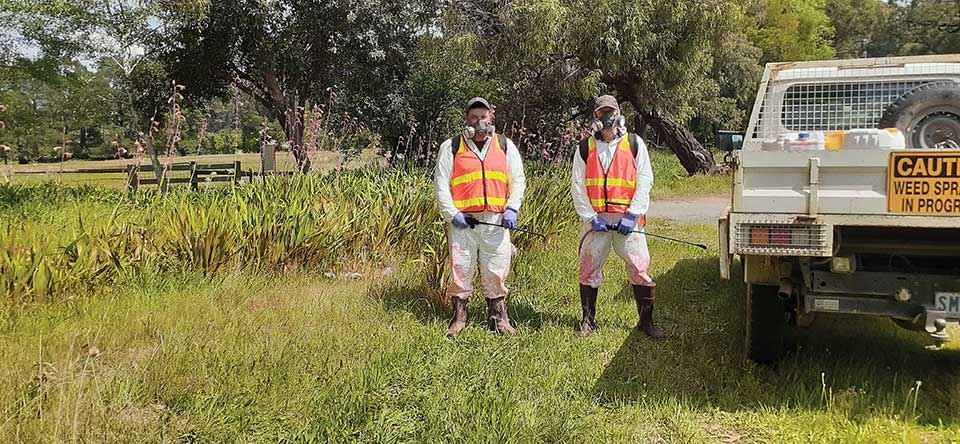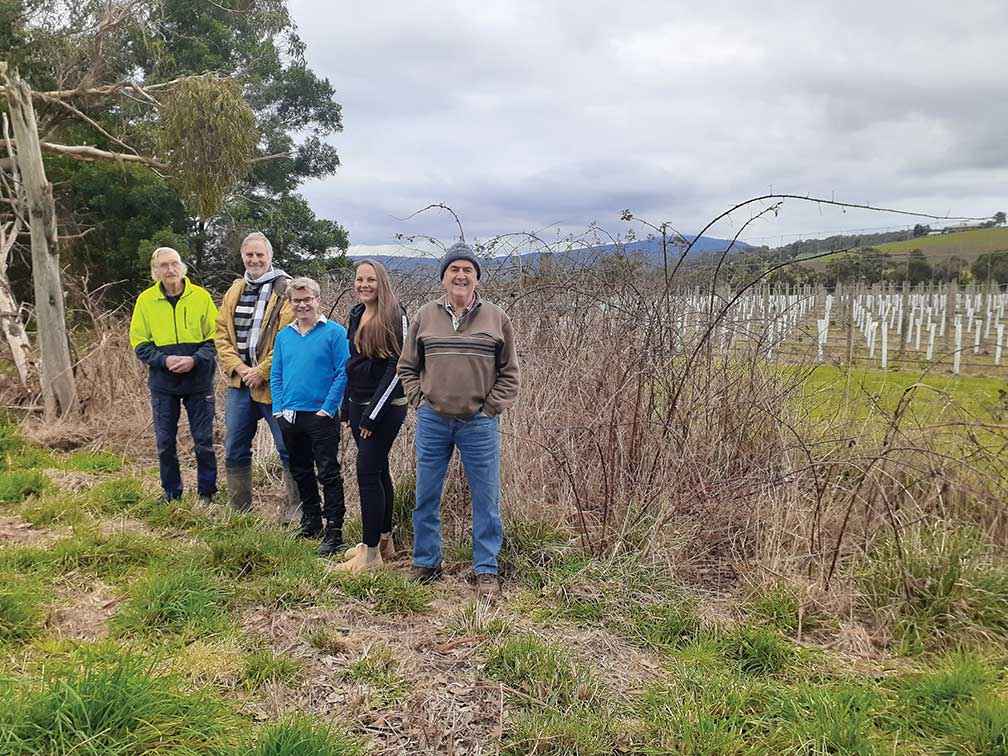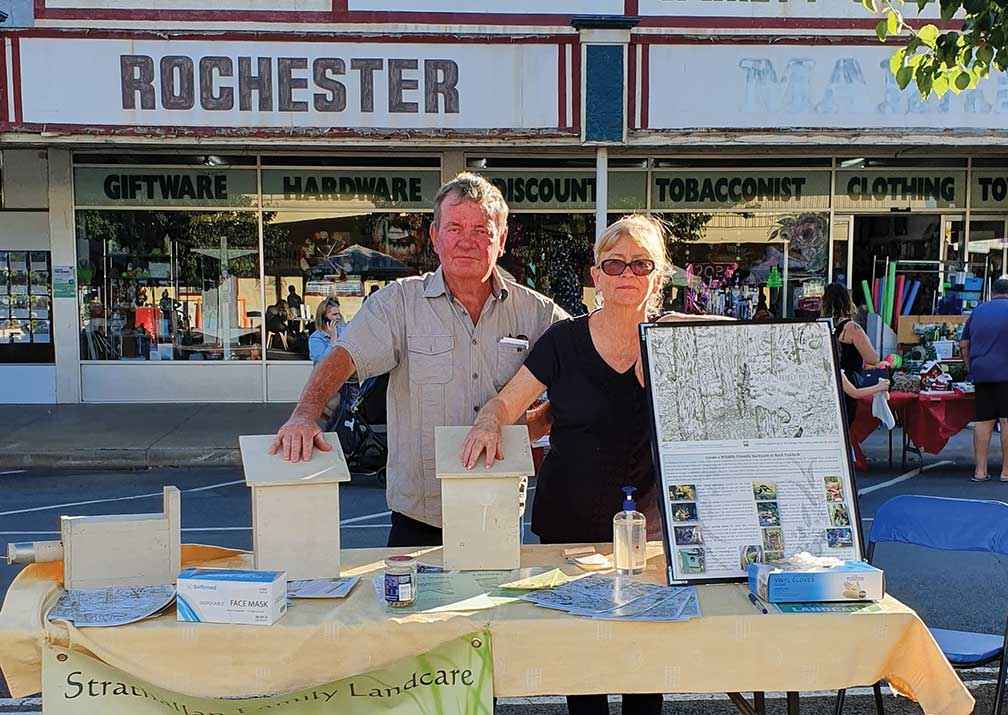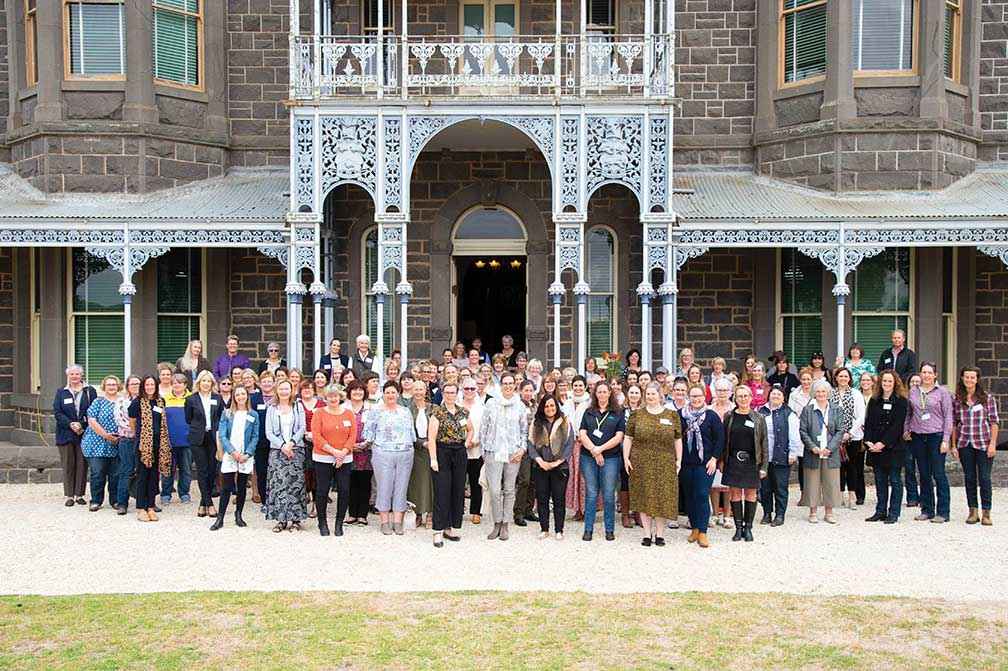Victorian Landcare Magazine - Spring 2021, Issue 82

The Australian Government Partnerships for Landcare Award acknowledges the leadership and achievement of a partnership between individuals, groups, networks, or organisations.
A partnership between Northern Yarra Landcare Network (NYLN) and VicRoads has achieved the treatment of 190 sites of invasive weeds along 14 kilometres of Melba Highway roadside in the Yarra Valley. The sites ranged from small outbreaks to large infestations of up to 1000 square metres.
NYLN member Dixons Creek Landcare Group had identified weeds on the Melba Highway and adjacent properties as a priority for several years, concerned about the ongoing threat to private properties and waterways.
The Northern Yarra Weed Action Group (NYWAG) was established in 2011 with the support of the Victorian Blackberry Taskforce in response to the 2009 Black Saturday bushfires. NYWAG has worked with more than 300 landholders, aware that long-term weed control is only possible through collective action across boundaries. Many of the infestations along the Melba Highway were on VicRoad’s land as well as 75 private properties including five substantial vineyards.

Above: Dixons Creek Landcare Group members stand near a treated outbreak of blackberry on the boundary with a local vineyard on Melba Highway north of Yarra Glen.
Discussions between NYWAG and VicRoads began in 2020 to develop a long-term plan for the project. Funding for a NYWAG part-time project officer came through the Federal Government Communities Environment Program.
The project officer set about working with landholders to treat their own weeds to complement the work being done on roadsides through the partnership with VicRoads. This involved multi-owner consultation, property planning, contractor engagement, introductions to relevant agency partners and the borrowing of NYLN equipment. Melbourne Water was also instrumental in addressing weed issues on nearby waterways, including creek crossings and adjacent Yarra River tributaries on private land.
Negotiations and co-ordination were complex. Added to this was the challenge presented by the identification of new weeds, including St John’s wort and watsonia which required adjustment to the treatment plan.
Access to roadside sites from inside private property boundaries needed to be coordinated. At times this involved vineyards which have traditionally been reluctant to be involved in weed treatment programs because of the perceived threat to vines. Treatment of weeds very close to vines was dictated by the seasons and local conditions. Decisions were often made on an hour-by-hour basis depending on wind speed and direction.
According to Amy Orlowski from VicRoads the project benefitted from the knowledge and the agility of those on the ground.
“The project officer from NYWAG was able to reassure landholders that the weed control was going to be done effectively. VicRoads was also able to intervene and negotiate when it appeared roadside slashing had the potential to interfere with the planned works. We negotiated with the slashing contractors and alerted them to the specific needs at different locations to avoid damage to treated sites,” Amy said.
Monitoring of the 190 treated sites will be carried out this spring. John Birse from NYLN says the Melba Highway has long been regarded as a vector for weeds.
“We are proud to say this integral partnership with VicRoads has not only neutralised the threat of weeds spreading along the highway, but formed the basis of an ongoing arrangement with landowners founded on trust and cooperation,” John said.
The existence of endangered squirrel gliders on members properties was discussed at an early meeting of the Strathallan Family Landcare Group.

Above: John and Veronica Groat from Strathallan Family Landcare Group with nestboxes for squirrel gliders at the Rochester Market.
The group advocated for a study that was conducted by the then Department of Sustainability and Environment in 2009. Locals have now built and installed more than 300 nest boxes along the Campaspe River reserve. Local farming families monitor the boxes on their properties and river boundaries and report their sightings and findings. The group has partnered with researchers from Deakin University, the Strathallan Glider Sanctuary, Echuca–Moama Men’s Shed, scout groups, school students, the Shire of Campaspe, North Central CMA, and Landcare groups in the Campaspe Shire on squirrel glider conservation and habitat protection.
The Corangamite CMA’s partnership with Landcare in its region involves 10 Landcare networks and 150 Landcare groups. In 2015 a statement of partnership based on principles of communication, respect, devolving responsibility and building capacity was developed and signed by the CMA and the Landcare networks.

Above: Members of the Corangamite Rural Women’s Network at Barwon Park Mansion in 2019.
Network chairs and Landcare facilitators meet on a quarterly basis with the CMA to work collaboratively on shared projects and informally through an online community of practice forum. This forum led to the co-development of the ‘small blocks, big dreams’ project, which engages peri-urban landholders in best practice integrated catchment management. In 2014 the CMA fostered the formation of the Corangamite Rural Women’s Network. The network brings rural women together to strengthen community resilience, empower them to contribute, be seen as equal, and to influence decision making both on and off farm.

Above: Sponsors' logos for this Landcare Award